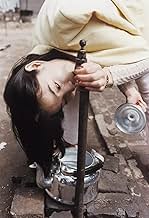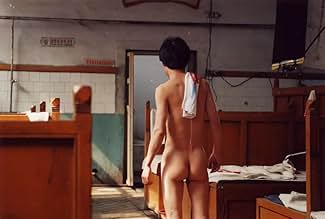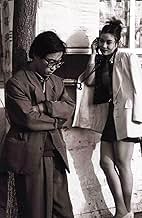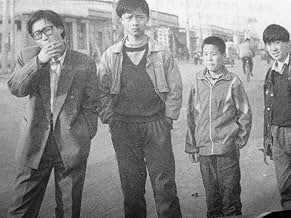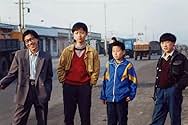IMDb रेटिंग
7.4/10
3.6 हज़ार
आपकी रेटिंग
अपनी भाषा में प्लॉट जोड़ेंA small town pickpocket whose friends have moved on to higher trades finds himself bitter and unable to adapt.A small town pickpocket whose friends have moved on to higher trades finds himself bitter and unable to adapt.A small town pickpocket whose friends have moved on to higher trades finds himself bitter and unable to adapt.
- पुरस्कार
- 7 जीत और कुल 1 नामांकन
फ़ीचर्ड समीक्षाएं
Xiao Wu is a pickpocket in Beijing. Stuck on the bottom rung of the criminal ladder despite his advance into adult years, he heads a small group of thieving street urchins who haunt the back streets of the city. Xiao Wu is a surly character, prone to throwing away his cigarette ends when in other people's homes. His time is whiled away with games of Mahjong and American pool played out in the street and he has few close friends.
Xiao Wu's brother, Xiao Yong, once himself a petty thief, is now a cigarette trader and brothel-owner. Xiao Yong, shamed by his criminal roots and his brother's failure to move on from the same position, excludes Xiao Wu from his wedding invitations and refuses to accept his wedding gift of ill-gotten money. Later on, Xiao Wu also discovers the shame that his hardworking parents feel for their pickpocket son.
A sense develops that the world is moving on and that Xiao Wu is being left behind; this is increased by the ongoing police-led evictions from the street where he spends much of his time a new building project is on its way. Xiao Wu finds a glimmer of hope in his encounters with Mei Mei, an employee at the local brothel. The taciturn pickpocket opens up a little in her presence and the two of them bond, somewhat oddly from a Western perspective, through karaoke singing. Xiao Wu suddenly finds his singing voice when alone in a bathhouse; his plain voice resounds poignantly in the large, grimy, empty room. It is a rare moment of beauty.
When Xiao Wu buys a pager (state of the art in 1997) to keep in touch with Mei Mei it seems that he is starting to open up just a little to the changing world. But Mei Mei's sudden disappearance, along with his alienation from his family, leaves Xiao Wu without direction. A grim lack of purpose takes hold again. In the final frames of the film he is publicly humiliated, bringing the story to a sad end.
The footage in this film is much grainier than many people made be used to, but this is not necessarily a weakness: the image quality suits the grey, dilapidated city streets. The hand-held camera adds intimacy to the karaoke scenes and captures the distance between the two brothers as they walk separately through the same streets. The muffled state of the soundtrack takes some getting used to, but writer-director Zhang Ke Jia was clearly working on a limited budget for his first feature. The non-professional cast, however, is surprisingly effective; Hong Wei Wang is a real find, exuding a seedy charm in the lead role.
The Artificial Eye DVD which I watched this film on did not provide subtitles for many of the voices on radio and television, nor for some of the secondary characters, but there is an enormous amount of visual detail to take in as well. China simply does not feature enough on cinema screens, but this fine film suggests hope for the future.
Xiao Wu's brother, Xiao Yong, once himself a petty thief, is now a cigarette trader and brothel-owner. Xiao Yong, shamed by his criminal roots and his brother's failure to move on from the same position, excludes Xiao Wu from his wedding invitations and refuses to accept his wedding gift of ill-gotten money. Later on, Xiao Wu also discovers the shame that his hardworking parents feel for their pickpocket son.
A sense develops that the world is moving on and that Xiao Wu is being left behind; this is increased by the ongoing police-led evictions from the street where he spends much of his time a new building project is on its way. Xiao Wu finds a glimmer of hope in his encounters with Mei Mei, an employee at the local brothel. The taciturn pickpocket opens up a little in her presence and the two of them bond, somewhat oddly from a Western perspective, through karaoke singing. Xiao Wu suddenly finds his singing voice when alone in a bathhouse; his plain voice resounds poignantly in the large, grimy, empty room. It is a rare moment of beauty.
When Xiao Wu buys a pager (state of the art in 1997) to keep in touch with Mei Mei it seems that he is starting to open up just a little to the changing world. But Mei Mei's sudden disappearance, along with his alienation from his family, leaves Xiao Wu without direction. A grim lack of purpose takes hold again. In the final frames of the film he is publicly humiliated, bringing the story to a sad end.
The footage in this film is much grainier than many people made be used to, but this is not necessarily a weakness: the image quality suits the grey, dilapidated city streets. The hand-held camera adds intimacy to the karaoke scenes and captures the distance between the two brothers as they walk separately through the same streets. The muffled state of the soundtrack takes some getting used to, but writer-director Zhang Ke Jia was clearly working on a limited budget for his first feature. The non-professional cast, however, is surprisingly effective; Hong Wei Wang is a real find, exuding a seedy charm in the lead role.
The Artificial Eye DVD which I watched this film on did not provide subtitles for many of the voices on radio and television, nor for some of the secondary characters, but there is an enormous amount of visual detail to take in as well. China simply does not feature enough on cinema screens, but this fine film suggests hope for the future.
Unlike a lot of other contemporary Chinese films, Xiao Wu succeeds in gaining viewers empathy for the title character. We never really find out how the so-called "artisan pickpocket" got himself into the state he's in; it's almost as if he woke up one morning to find that he was alone and jobless at an age when he should be settling down like all of his friends. However, not knowing how he arrived at this point makes his growing desperation more tangible as we see him reaching out to everyone he can, only to be rejected.
Wang Hongwei is amazing as the title character, he makes it easy to relate to the character's loneliness and longing. Considering the actors in Xiao Wu are all amateurs, Wang's performance is even more amazing. Granted, he was given a great character to work with: in spite of his occupation, Xiao Wu is a nice guy. (His beautifully awkward relationship with the karaoke hostess is a fine example of this).
All in all, I think this is one of the best Chinese films from the past decade. The characters are better developed than in other contemporary films, and the story is neither contrived nor simplistic. Xiao Wu would seem to be a lot more accessible than other Chinese art films because it lacks the slow bits characteristic of that genre. I would highly recommend Xiao Wu to anyone interested in Chinese cinema.
Wang Hongwei is amazing as the title character, he makes it easy to relate to the character's loneliness and longing. Considering the actors in Xiao Wu are all amateurs, Wang's performance is even more amazing. Granted, he was given a great character to work with: in spite of his occupation, Xiao Wu is a nice guy. (His beautifully awkward relationship with the karaoke hostess is a fine example of this).
All in all, I think this is one of the best Chinese films from the past decade. The characters are better developed than in other contemporary films, and the story is neither contrived nor simplistic. Xiao Wu would seem to be a lot more accessible than other Chinese art films because it lacks the slow bits characteristic of that genre. I would highly recommend Xiao Wu to anyone interested in Chinese cinema.
He is talented pickpocket but also sends the ids back to police. On the outside he is a boring persona but he has multitude of charisma. He falls in love, which was his chance to get out of all this but couldnt. He isnt ready to let go of his talent until the karma catches up with him. Will he beat the karma or get sucked of even the last bit of conscience he has left. The hiring of non-professional actors makes this film much better.
A 20-something in rural China who makes his small time living being a pickpocket faces two changes which pressure his life: a very public crackdown on crime, and a childhood friend having moved on to a respectable life, soon to be married, but not inviting him to the wedding. China itself seems to be changing, with signs of construction and modernization everywhere, but the main character, Xiao Wu (Wang Hongwei) is not progressing along with it, stubbornly sticking to his ways, despite the warnings from others.
There is a sense of forlorn emptiness here, as Xiao Wu starts falling for a karaoke girl, desperately seeking more meaning out of their relationship than she is. He returns home to his family, who are peasant farmers, and finds that his brothers are also moving on in life, and his father is angry to the point of casting him out. There are glimmers of him wanting to be a good person, like when he gives his mother a ring, or when he anonymously returns ID cards from the wallets he's stolen because they're hard for the owners to replace, but he continues stealing and seems hopelessly non-aspirational, thus making him a tough character to like.
Gandhi once said that "the true measure of any society can be found in how it treats its most vulnerable members," and while you could argue that Xiao Wu himself has preyed on the vulnerable, when he's publicly chastised on TV and later handcuffed to a post and surrounded by people gawking at him, the feeling of vulnerability is intense. We get the conflicting sense of it being just for him to punished, but at the same time, pity for him arriving at this place in life, and what his prospects might be. Therein lies the power of the film, and I certainly admired it.
The reason for not giving the film a higher rating was just a lack of personal enjoyment for what was a dreary story, centered exclusively on the main character, who was stuck in one gear. I would have loved a contrast in the development of his friend's or family's characters, those getting on in the world as best they can. Certainly a solid debut film from Jia Zhangke though.
There is a sense of forlorn emptiness here, as Xiao Wu starts falling for a karaoke girl, desperately seeking more meaning out of their relationship than she is. He returns home to his family, who are peasant farmers, and finds that his brothers are also moving on in life, and his father is angry to the point of casting him out. There are glimmers of him wanting to be a good person, like when he gives his mother a ring, or when he anonymously returns ID cards from the wallets he's stolen because they're hard for the owners to replace, but he continues stealing and seems hopelessly non-aspirational, thus making him a tough character to like.
Gandhi once said that "the true measure of any society can be found in how it treats its most vulnerable members," and while you could argue that Xiao Wu himself has preyed on the vulnerable, when he's publicly chastised on TV and later handcuffed to a post and surrounded by people gawking at him, the feeling of vulnerability is intense. We get the conflicting sense of it being just for him to punished, but at the same time, pity for him arriving at this place in life, and what his prospects might be. Therein lies the power of the film, and I certainly admired it.
The reason for not giving the film a higher rating was just a lack of personal enjoyment for what was a dreary story, centered exclusively on the main character, who was stuck in one gear. I would have loved a contrast in the development of his friend's or family's characters, those getting on in the world as best they can. Certainly a solid debut film from Jia Zhangke though.
This no budget film is shot with a hand held camera. It shows, but this does not affect the quality of the film. The director has made an intense movie about, Chinese street life. However the culture in China is very different from the west, we can see that the problems of little Wu are universal.
क्या आपको पता है
- ट्रिवियाJia Zhang-ke: the man sent by Xiao Yang to return Xiao Wu's wedding present.
- कनेक्शनReferenced in Ren xiao yao (2002)
टॉप पसंद
रेटिंग देने के लिए साइन-इन करें और वैयक्तिकृत सुझावों के लिए वॉचलिस्ट करें
- How long is Pickpocket?Alexa द्वारा संचालित
विवरण
बॉक्स ऑफ़िस
- दुनिया भर में सकल
- $1,569
- चलने की अवधि1 घंटा 50 मिनट
- रंग
- पक्ष अनुपात
- 1.37 : 1
इस पेज में योगदान दें
किसी बदलाव का सुझाव दें या अनुपलब्ध कॉन्टेंट जोड़ें


